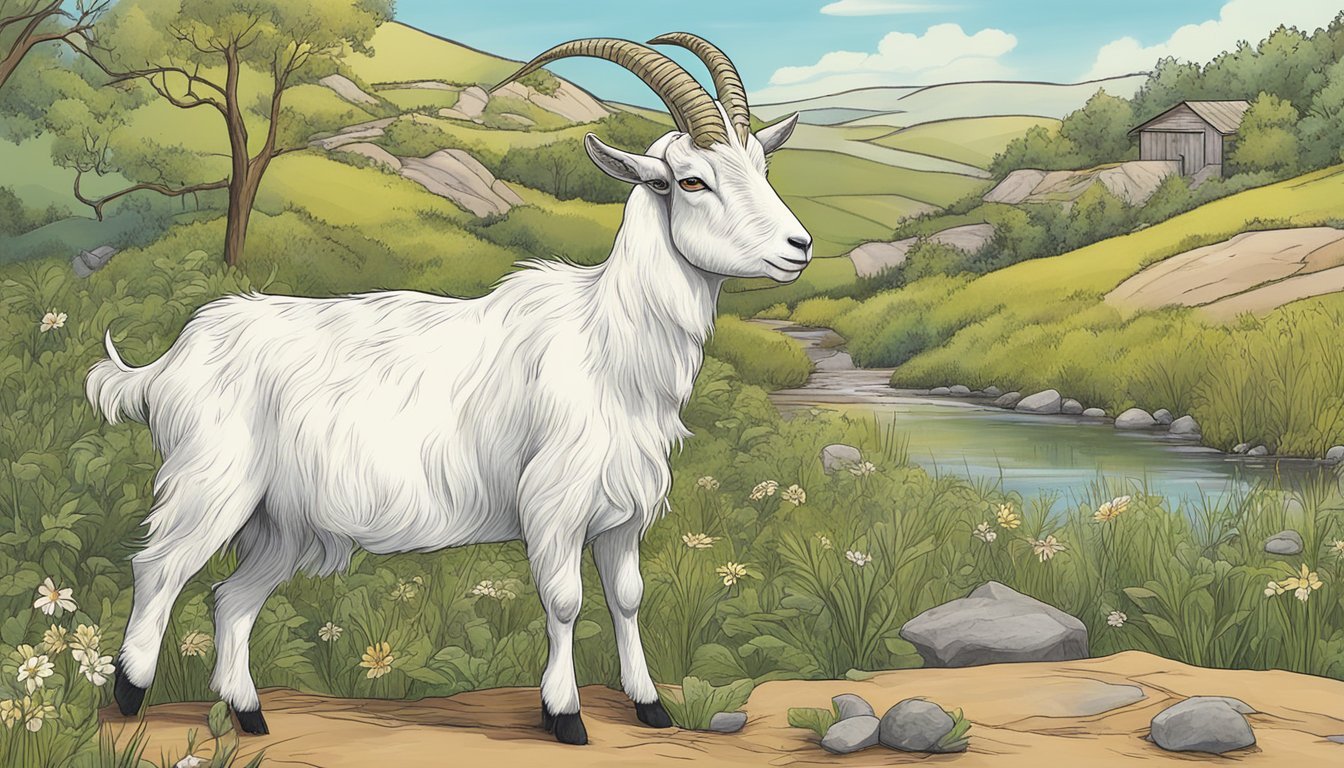What Are the Best Practices for Natural Goat Care and Alternative Medicines?
Exploring Holistic Approaches
Goats are versatile and intelligent animals that have been a part of human agriculture for thousands of years. When it comes to their care, a growing interest in natural and holistic approaches has led many goat owners to explore alternative methods. These practices emphasize the animal's overall well-being, extending beyond the absence of disease to include their physical, psychological, and environmental health. Employing natural goat care strategies can lead to a more sustainable and ethical management system that aligns with the increasing demand for organic and humane farming practices.
Natural medicine for goats incorporates the use of herbal remedies, dietary supplements, and other non-conventional methods to prevent and treat health issues. This approach often involves preventive care, such as proper nutrition, regular parasite management, and stress reduction, to enhance the goats' intrinsic health. Complementary to this, holistic remedies draw from a wide range of resources including plants, minerals, and other naturally occurring substances. Applied properly, they can support the immune system, improve digestion, and address specific health challenges with fewer side effects compared to conventional treatments.
Adopting the best practices for natural goat care and alternative medicines requires a foundational understanding of goat anatomy and behavior, as well as a keen observation of their needs and responses to various treatments. Caretakers who are knowledgeable in these methods can effectively integrate natural care into their routine, potentially resulting in healthier herds and a more harmonious relationship between goats and their environment. It is important, however, to consult with veterinary professionals who are experienced in natural and holistic goat care to ensure that the treatment plans are safe and effective for the animals.
Fundamental Aspects of Goat Care
In managing a healthy goat herd, certain practices are essential to ensure their overall health. These range from providing the right shelter and nutrition to regular health checks and proper breeding management.
Housing and Shelter Requirements
For goats, adequate shelter is critical in protecting them from the elements and predators. A suitable pen or housing must have dry bedding, plenty of space for the number of animals housed, and proper ventilation to prevent moisture buildup, which can lead to respiratory issues. Ideally, shelters should be easy to clean to maintain goat health.
Basic Nutrition and Feeding Practices
Goats require a diet that includes a balance of hay, grains, minerals, and salt to maintain their health. Nutrition should be tailored to the goat's life stage, with lactating dairy goats requiring higher energy intake. For natural care of goats, it's important to source feed from organic suppliers when possible and provide a variety of forage options for goats to browse.
Hay: Compose the majority of their diet with good quality hay, such as alfalfa or grass hay, to provide necessary fiber.
Grains: Offer in moderation, depending on the nutritional needs; grain should not exceed 50% of their overall diet.
Minerals: Ensure a constant supply of goat-specific mineral supplements to prevent deficiencies.
Salt: Provide access to loose salt or a salt block to help regulate body functions and prevent salt toxicity from inadequate or excessive consumption.
Importance of Clean Water and Hydration
Hydration plays a pivotal role in the overall health of a goat herd. Clean, fresh water must be available at all times. Water containers should be cleaned regularly to prevent algae and bacteria growth, which could lead to goat diseases.
Routine Health Checks and Veterinary Care
Regular health assessments are necessary to prevent and treat common goat diseases and parasites. Each goat should be examined for signs of distress or illness, and a scheduled deworming program should be adhered to. A veterinarian familiar with goats can provide guidance on vaccinations and natural care alternatives.
Breeding Management and Kidding Season
Managing breeding season effectively ensures the health of both does and impending offspring. Bucks should be separated from does to control breeding timing, and adequate care must be given during kidding season, including preparing a clean, warm area for birthing. Close monitoring of pregnant does for signs of labor is crucial.
Natural Health Management
In natural goat care, maintaining robust health through preventative measures and natural remedies is critical. By integrating herbal supplements, targeted parasite control methods, proper nutrition, and essential oils, one can sustain and improve goat health without relying heavily on synthetic pharmaceuticals.
Herbal Supplements and Nutritional Additives
Herbs and nutritional additives play a crucial role in bolstering a goat's immune system. Garlic, for example, is known for its immune-boosting properties and can be used to naturally ward off parasites. Kelp is another beneficial supplement; it's rich in minerals like iodine and selenium, which are vital for thyroid function and overall health. Providing a diverse range of herbs and minerals, such as calcium and selenium, can lead to better health outcomes for goats.
Holistic Approaches to Parasite Control
Effective and natural parasite control is essential to prevent ailments such as coccidiosis and diarrhea in goats. Herbal dewormers, including those made from a mixture of herbs and garlic, can be a safe alternative to chemical dewormers. Apple cider vinegar and diatomaceous earth are other natural products that can be added to feed or used in the environment to help manage parasite loads.
Preventive Practices for Common Ailments
Prevention is better than cure, especially when dealing with goat health. Regular check-ups, maintaining a clean environment, and providing nutritional additives like essential minerals can prevent common illnesses such as mastitis and external parasites such as lice and mites. Boosting the immune system through natural supplements is a proactive strategy to reduce the incidence of infection and worms.
Using Essential Oils for Goat Health
Essential oils can be used cautiously for various health benefits in goats. Tea tree oil is revered for its antimicrobial properties, whereas lavender oil is soothing and can help to alleviate stress. Peppermint oil, with its cooling sensation, is especially useful during the hot season to provide relief. However, the use of essential oils must be done with proper knowledge and dilution to ensure the safety and wellbeing of the goats.
Integration of Conventional and Alternative Therapies
Integrating conventional and alternative therapies in goat care requires knowledge of both methods to optimize overall health. It is essential to know when to employ pharmaceuticals like antibiotics and vaccines and when to use natural remedies.
Understanding When to Use Antibiotics and Vaccines
Antibiotics are crucial in combating bacterial infections in goats that can escalate if left untreated. The intervention should be precise and after consultation with a vet, especially since the overuse can lead to resistance. Vaccines, on the other hand, are preventive measures endorsed by the FDA to shield goats from common diseases. They are a vital component in a goat's health regimen, providing immunity against infectious agents and reducing the future need for chemical interventions.
Striking a Balance Between Natural and Chemical Interventions
Alternative medicines offer a holistic approach to goat health, encompassing various practices like herbal remedies, nutritional supplements, and stress-reducing techniques. These methods prioritize natural care without immediately resorting to chemicals. However, it's vital to strike a balance. While some conditions may be managed with natural medicine, others necessitate a more aggressive approach or a combination of both. The guiding principle should be the overall health of the animal, with decisions grounded in evidence-based practices and the professional advice of a knowledgeable vet.
Alternative Medicine Practices
In natural goat care, alternative medicine practices often utilize traditional herbs and plants, tinctures and oils, with the guidance of a herbalist to support the immune system and general health, including deworming.
Application of Traditional Herbs and Plants
Various herbs are used to strengthen a goat's immune system and provide holistic care. For instance, red raspberry leaf can enhance reproductive health, while oregano has natural antibacterial properties. Comfrey is often applied to aid in the recovery of wounds, and wormwood can be an effective natural dewormer. Red clover is recognized for its beneficial support in respiratory health.
Preparation and Use of Tinctures and Oils
Preparing tinctures and oils with herbs allows for concentrated and easy application of alternative treatments. For example, oregano oil, when diluted correctly, could support the goat's defenses against infections. Products like Molly’s Herbals combine various herbs in ready-to-use formats, often focused on deworming and boosting overall health.
Role of a Herbalist in Goat Care
A knowledgeable herbalist plays a crucial role in determining the correct herbs and dosages for goats. They provide a holistic approach to goat care, tailoring herbal remedies to specific needs and ensuring that any treatment supports overall wellbeing without causing harm. The herbalist's expertise ensures that all applications contribute to a sustainable natural care regime.
Dietary Strategies for Special Needs Goats
Goats with special needs require targeted dietary adjustments, particularly during critical phases such as kidding and lactation, or when addressing nutritional deficiencies and physiological issues. A careful balance of supplements, forage, and grains is paramount for sustaining optimal goat health.
Feeding During Kidding and Lactation
During kidding season and lactation, does have increased nutritional needs. It's essential to provide a diet rich in calcium and protein to support milk production and to prevent conditions like milk fever. High-quality forage and grain mixes enhanced with dietary supplements such as molasses for energy and fenugreek to stimulate appetite can be beneficial. Offering salt licks and minerals such as selenium and vitamin E boosts overall health and prevents deficiency-related problems.
Addressing Nutritional Deficiencies
Numerous factors including the quality of soil and available forage can lead to nutritional deficiencies in goats. Soy bean meal can provide a boost of necessary protein while kudzu and other legumes supply critical nutrients. Additionally, dietary additives like vinegar, which can help stabilize pH levels, together with trace mineral salts and tea bags, the latter for tannins, should be incorporated selectively. Regular blood tests are advisable to monitor the herd's status and adjust the diet accordingly, ensuring deficiencies are properly addressed.
Management of Common Physiological Issues
For goats that are prone to conditions such as bloat or fever, management through diet can be a crucial preventive measure. A diet that includes forage with low bloat potential is advised. Also, slow introduction of grains and dietary supplements helps prevent digestive upsets. Availability of fresh water with apple cider vinegar may improve digestion and mitigate bloat risks. Goats displaying signs of fever may benefit from increased antioxidants found in various vitamins and minerals, possibly supplemented through natural sources like vitamin-rich leaves or herbs.
Pasture Management and Foraging
Proper pasture management and foraging are essential for maintaining a healthy goat herd, providing natural deworming while optimizing their diet with a variety of herbs, forage, and minimal reliance on hay and concentrates.
Optimizing Pasture Land for Goats
Rest and Rotate: To promote regrowth and prevent parasite issues, it is crucial to practice rotational grazing. Goats with higher nutritional needs should be allocated to the best quality pastures, allowing for areas to rest, reducing the parasite load in the soil.
Diverse Forage: Goats thrive on a variety of forages and are particularly effective at weed control. Introducing a mix of plants suitable for goats can help maintain soil health and provide a natural diet that decreases the need for supplementary feeding.
Parasite Management: Utilize a natural approach to deworming by selecting herbs and forages that are known to help control internal parasites. This can reduce the reliance on chemical dewormers and foster a more sustainable farming practice.
Soil Health: Healthy soil contributes to healthy plants and animals. Regular soil testing to monitor nutrient levels can inform necessary adjustments in pasture management, ensuring that forage remains nutritious and abundant for the goat herd.
By following these pasture management and foraging practices, caretakers can ensure their goats receive optimal nutrition while also managing weeds and reducing the incidence of parasitic infections.
Common Challenges in Goat Care
Caring for goats can be a rewarding experience, but it also presents a variety of challenges ranging from parasite management to breeding and environmental stressors. Understanding how to efficiently confront these challenges is paramount for maintaining a healthy goat herd.
Addressing Parasite Issues
Goats are susceptible to internal parasites like worms and external ones such as lice and mites. To control parasites, regular fecal egg counts and the use of a FAMACHA score chart are effective practices. Incorporating natural remedies, such as feeding goats copper supplements or offering baking soda free-choice, can support overall parasite resistance.
Handling Breeding and Fertility Challenges
Breeding and fertility issues can affect both does and bucks. It's essential to monitor goats during the breeding season for any signs of reproductive problems. A holistic approach may include natural supplements to boost fertility and adherence to a breeding schedule aligned with the does' estrous cycles.
Managing Seasonal Health Concerns
Goats face various health challenges that can fluctuate with the seasons. During cold months, conditions like pneumonia can arise, while heat stress is a concern in the summer. Season-specific goat diseases require preemptive measures, such as appropriate shelter and climate-appropriate diet adjustments, to mitigate these risks.
Creating Solutions for Environmental Stressors
Goats are adaptable animals, but they still face environmental stressors such as extreme temperatures or inadequate foraging options. Flexibility in pasture management, ensuring clean water access, and providing windbreaks and shade are crucial for creating a safe and stress-free environment. A natural medicine strategy might include herbal supplements to strengthen their resilience against these stressors.
Resources and Further Reading
In the pursuit of best practices for natural goat care and alternative medicines, there are various resources available, from specialized books to interactive workshops. They provide valuable insights and practical tips for anyone looking to deepen their understanding and enhance their practice of holistic goat care.
Books and Literature on Goat Health and Care
For those seeking in-depth knowledge, several books stand out as essential reads. "The Complete Herbal Handbook for Farm and Stable" by Juliette de Bairacli Levy offers a comprehensive look at herbal remedies for animals, while "Natural Goat Care" by Pat Coleby delves into a holistic approach to goat wellness. These texts are rich in actionable information, covering topics from nutrition to disease prevention with a focus on natural methodologies.
Online Communities and Forums for Goat Enthusiasts
Online platforms can be an incredible resource for exchanging information and experiences with other goat owners and enthusiasts. Websites such as The Goat Spot or the BackYardHerds forum provide interactive environments where one can ask questions, share advice, and stay abreast of the latest in goat care practices. These communities are supportive and rich with anecdotal wisdom, peer-reviewed suggestions, and moral support.
Workshops and Training for Holistic Goat Care
Hands-on workshops offer valuable training for those interested in holistic goat care methods. Organizations like the Holistic Goat Care Guild might provide seminars and classes where one can learn directly from experienced practitioners. Practical demonstrations allow for a deeper understanding of natural treatments and techniques, equipping goat owners with the skills to implement these practices effectively.
In each resource, learners find an opportunity to enhance their approach to goat care, tapping into the collective wisdom of experts and seasoned caretakers alike.
Conclusion
Natural goat care emphasizes a holistic approach that looks at the animal's overall health and well-being within the context of their environment. This methodology integrates natural medicines and practices, focusing on the prevention of illness through a strong emphasis on diet, housing, and stress reduction.
Key elements for maintaining goat health naturally include:
Nutritious Diet: Ensure goats have access to a balanced diet full of essential nutrients.
Parasite Prevention: Utilize plant-based remedies, like cayenne tincture, to manage parasites effectively.
Gastrointestinal Health: Incorporate items like baking soda into the diet to support gut health.
People who care for goats must remain informed about various natural remedies and interventions. By choosing a path that includes natural medicine and remedies, they contribute to a sustainable and ethical approach to animal husbandry. They should also bear in mind the importance of veterinary advice when needed, as natural care complements but does not replace professional medical treatment.
Incorporating natural care practices requires education and an understanding of the unique needs of goats. The commitment to learning and implementing these practices substantiates a respectful and nurturing relationship between farmers and their herds, ultimately leading to a thriving farm environment.






